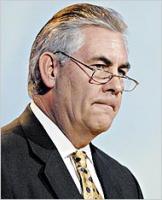Anyone celebrating ExxonMobil’s recent announcement that it acknowledges the truth of climate change can stick the cork back in the bottle. While Exxon’s vice president for public affairs, Kenneth Cohen cast climate cange as undeniable, ExMo CEO Rex Tillerson made it clear yesterday that the company is still happily clinging to doubt.
“My understanding is there’s not a clear 100 percent conclusion drawn,” Tillerson told an industry gathering in Houston. “Nobody can conclusively 100 percent know how this is going to play out. I think that’s important.”
Tillerson also said he sees no role for Exxon in helping to develop alternatives like ethanol, quipping, “I don’t have a lot of technology to add to moonshine.”
It looks like the deniers might be able to count on a few more years of ExMo funding , after all.
Subscribe to our newsletter
Stay up to date with DeSmog news and alerts






